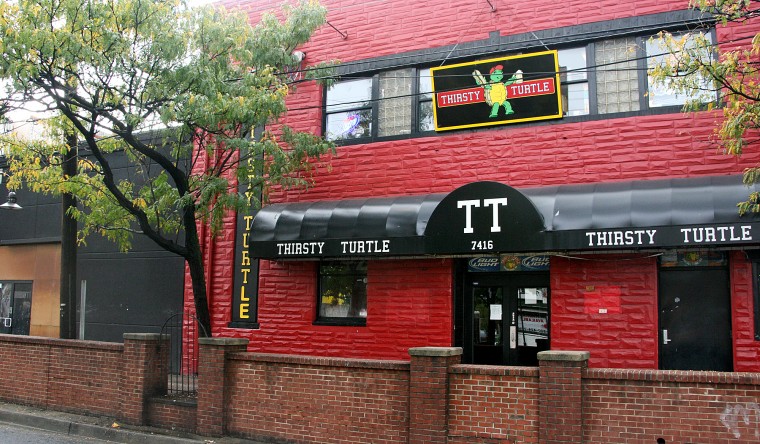
Before it was home to the now-closed Thirsty Turtle, 7416 Baltimore Ave. has also housed a restaurant and a bowling alley over the years.
In the 1920s or 1930s, 35 cents got you a bowling lane at 7416 Baltimore Ave. In 2007, after a series of other businesses occupied the space, you could once again get what you wanted at bargain prices.
Depending on who you ask, Thirsty Turtle was either beloved or reviled for the inexpensive alcohol it offered to the student body until its owners ended a legal battle by surrendering its liquor license earlier this month.
That space has seen a continuous cycle of businesses shuttering its doors, according to long-time city residents. From fires to financial woes to allegedly serving underage patrons, the building is no stranger to complications.
And the Nov. 3 revocation of Turtle’s liquor license fits the pattern of revolving tenants in the venue.
Before the dance floor gleamed with sweating students, before the sticky floors and abundant Coors, the former two-story, 16-lane bowling alley offered beer and kosher hot dogs to feed the hungry and satisfy the thirsty, according to Mary Ayers, who co-owns the property as part of the long-running family business.
It was a place for students to bowl for physical education credit or to relax and attempt the perfect 300, said College Park Code Enforcement Manager Jeannie Ripley, who has worked for the city for more than 41 years.
In about 1940, the property was bought by Ayers’ father, Charles Gentile — or, as his employees fondly called him, Mr. Charlie.
“We’d go down to the bowling alley, and we’d have Cokes and peanut butter crackers, and then our dad would walk us home,” Ayers said. “It was a big part of our life; our dad worked so hard.”
However, a fiery catastrophe struck in 1960, as depicted in the book Images of America: College Park, by Stephanie Stullich and Katharine Bryant, which collected a series of photos depicting city history.
“Up to that time, my father had manual pinsetters, and then in about 1960 or so, he arranged that there’d be an automatic pinsetter,” Ayers said.
But while the alley was making the transition to modern technology, a fire ignited in an exhaust pipe, Ayers said. And thus, the bowling alley ceased to exist.
After some sprucing and renovating, the Italian Gardens restaurant emerged.
“I’m Italian, so it was a hail-fellow-well-met sort of place,” Ayers said.
And, alumni said, the friendly atmosphere — and decent food — drew a crowd of not only students but also city residents.
“We’d basically go there for pizza and to drink beer. … It wasn’t rowdy,” said alumna and university curator of literary manuscripts Beth Alvarez, who was working as a teacher in Prince George’s County at the time. “The ‘Vous [now Cornerstone Grill and Loft] was the place that had the bad reputation … a place that smelled bad and your feet stuck to the floor.”
And affordable prices attracted students.
“On Tuesday nights, they had all-you-can-eat French bread and spaghetti — $3.99,” said alumnus Dale Burnett. “When you’re hungry and 20 years old, that’s a deal.”
But in the late ’70s and early ’80s, restaurant owners realized the establishment could be used for other purposes.
“I think they saw the potential of becoming a good college hang out,” Cornerstone owner Mark Srour said.
The first floor stayed a restaurant — which Srour said served “your basic little bar food” — referred to as The Cellar, while the upstairs transformed into The Attic, a nighttime party scene, said Bob Ryan, director of public services for the city.
Yet, Srour said, the owner became caught in a scandal, and ownership transitioned to his wife, nephews and cousins.
“There was a lot of heat going on,” he said.
And with the transition in management, nightlife consumed the building. A little inside paint job and a new name — Terrapin Station — gave the place a different vibe.
“It became, in large part, a high school bar,” said District 2 Councilman Bob Catlin. “There were high school kids coming from 20 miles away to go there.”
In June 1999, the county liquor board put its foot down. It decided against renewing Terrapin Station’s liquor license, officials said at the time, for failing to maintain the correct food-to-alcohol ratio, forgetting to submit quarterly sales reports and violating the fire code.
“You could go in at 6 p.m., and they wouldn’t give you food,” said Catlin. “Their kitchen was out of service, I think.”
And, yet again, the bar was emptied.
After installing a sprinkler and altering the bar’s nightlife atmosphere to an upscale dining facility a few years later, Lupo’s Italian Chophouse opened up, Ryan said.
And finally, with an exterior painted a bold red and a refurbished interior — a new $150,000 light and sound system and stage and Greek letters adorning the upstairs walls — Thirsty Turtle emerged in December 2007 to create what co-owner Alan Wanuck told The Gazette would be the ultimate combination: a family friendly atmosphere by day and a party scene by night.
“Lupo’s tried harder than the Thirsty Turtle — just the look of the place, the color of it,” Catlin said. “It wasn’t something that would interest a lot of the residents to come there compared to Lupo’s, which did make a stronger attempt to be a fine dining establishment.”
And the building’s all-too familiar saga ended for Turtle when a bouncer allowed entrance to two underage police aides, resulting in the revocation and handing over of Turtle’s liquor license permanently. Wanuck has not yet said whether Turtle will reopen as a restaurant.
“Here we are today; the building’s sitting stagnant. A great clothing store like Urban Outfitters, Forever 21, Old Navy — somebody like that would be a great fit for that building,” Srour said. “It’s just too big of a place to have a bar because, unfortunately, you have to let all the underage people in just to survive. That’s why that building is kind of cursed, I guess. It’s just too big.”
roubein at umdbk dot com



